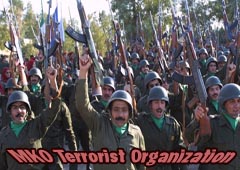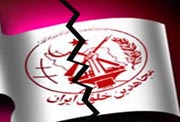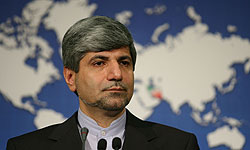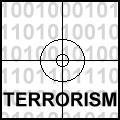The relocation of the members of the terrorist Mojahedin-e Khalq Organization (MKO, also known as the MEK,  PMOI and NCRI) in Albania will threaten the country’s national security, an Iranian legislator warned on Sunday.
PMOI and NCRI) in Albania will threaten the country’s national security, an Iranian legislator warned on Sunday.
On Thursday, US State Department Spokeswoman Jen Psaki said that the 14 members of the MKO left their camp in Iraq on Wednesday "for permanent relocation in Albania."
Tirana recently offered asylum to 210 members of the MKO members.
Speaking to ICANA about the development, Member of the Presiding Board of the Iranian Parliament Seyed Baqer Hosseini warned Tirana against the negative outcomes of the MKO members’ presence in the country, and asked, "How could the MKO, who had no pity for their own fellow countrymen, conduct a peaceful coexistence with foreign citizens?"
"The government of Albania should avoid repeating the same mistake that other countries have made with regard to the hosting of the MKO members because these people are dangerous both for that country’s national security and the entire region," Hosseini cautioned.
MKO is a terrorist group with a bad record of terrorist operations in Iran and other countries, including Iraq.
In a recent case, the MKO claimed that it can recruit extremist and terrorist groups in Iraq due to its three-decade-long stay in that country which has also provided them with some in-debt knowledge of the Arab country, and then organize bombing plots, suicide attacks and spark sectarian and ethnic conflict in a bid to make Iraq’s atmosphere tense similar to the present conditions in Syria.
Despite the efforts made by the Iraqi government to expel all MKO elements from Iraq, the western supporters of MKO, specially the US, have prevented their expulsion from the Muslim country so far.
In September 2012, the last groups of the MKO terrorists left Camp Ashraf, their main training center in Iraq’s Diyala province. They have been transferred to Camp Liberty transient facility near Baghdad.
The MKO, founded in the 1960s, blended elements of Islamism and Stalinism and participated in the overthrow of the US-backed Shah of Iran in 1979. Ahead of the revolution, the MKO conducted attacks and assassinations against both Iranian and Western targets.
The group started assassination of the citizens and officials after the revolution in a bid to take control of the newly-established Islamic Republic. It killed several of Iran’s new leaders in the early years after the revolution, including the then President Mohammad Ali Rajayee, Prime Minister Mohammad Javad Bahonar and Judiciary Chief Mohammad Hossein Beheshti who were killed in bomb attacks by MKO members in 1981.
The group fled to Iraq in 1986, where it was protected by Saddam Hussein and where it helped the Iraqi dictator suppress Shiite and Kurd uprisings in the country.
The terrorist group joined Saddam’s army during the Iraqi imposed war on Iran (1980-1988) and helped Saddam and killed thousands of Iranian civilians and soldiers during the US-backed Iraqi imposed war on Iran.

 terrorist group are not welcomed in any countries of the region.
terrorist group are not welcomed in any countries of the region. marathon was “event that affects everyone.” He said that “I believe that all governments should work to establish peace and security for all people of the world. The roots of these extremist and terrorist acts must be dried, and by no means should any type of violence be justified.”
marathon was “event that affects everyone.” He said that “I believe that all governments should work to establish peace and security for all people of the world. The roots of these extremist and terrorist acts must be dried, and by no means should any type of violence be justified.” to study ways of fight against terrorism.
to study ways of fight against terrorism.